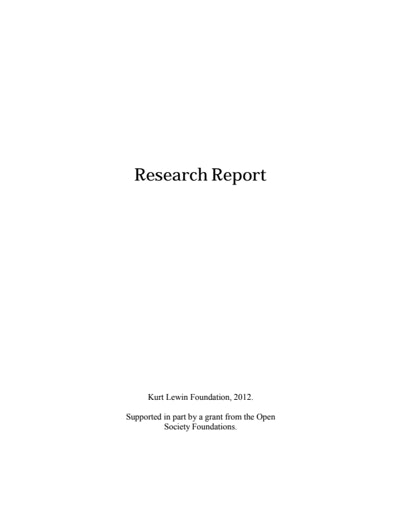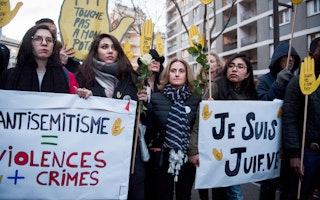Active Citizenship Can Change Your Country For the Better
By Andrej Nosko & Katalin Széger
Katalin Széger from the Kurt Lewin Foundation discusses Active Citizenship with Andrej Nosko of the Open Society Think Tank Fund.
You recently conducted a research project on Active Citizenship; what is Active Citizenship?
Active citizenship means people getting involved in their local communities and democracy at all levels, from towns to cities to nationwide activity. Active citizenship can be as small as a campaign to clean up your street or as big as educating young people about democratic values, skills and participation. Active citizenship is one of the most important steps towards healthy societies especially in new democracies like Hungary.
The Kurt Lewin Foundation conducted a one and a half year long research and development program in four schools located in eastern Hungary examining the relationship between schools and democratic citizenship. Students aged between 17 and 19 years old (11th–12th grade) and their teachers took part in the research which examined the place and impact of active citizenship, democratic values and social and political attitudes in education.
The report aimed to study the effect of the school as a place to develop the active citizenship of students. Though the concept of citizenship grounded in activity, responsibility and democratic values is emphasized in Hungarian educational policy, the views and opinions of the younger generation in Hungary are, it appears, changing in a direction not conducive to bolstering active citizenship. For this reason the Kurt Lewin Foundation constructed a research and educational project which comprised on the one hand an endeavour to enhance active citizenship by means of various developmental activities and on the other hand data collection around the issue of active citizenship.
As we understand it, active citizenship is a combination of knowledge, attitude, skills and actions that aim to contribute to building and maintaining a democratic society. Active Citizenship supports democratic cooperation that is based on the acceptance of universal human rights and the rule of law, values diversity and includes the whole community. Education towards gaining this knowledge and developing and practicing the skills take place in all levels of our shared social life, but schools play a very important role in it.
More and more, we see that extreme solutions are in demand when it comes to Europe’s problems. Active citizenship has a crucial role to play in this context to allow citizens to interrogate real solutions to problems rather than indulging in scapegoating, discrimination and other tactics peddled by extremists.
Your report focused on the role of schools in active citizenship; what did it find?
We focused on the effect that organizational culture in schools and the hidden curriculum (a set of rules, norms, attitudes and behaviors that are not part of the national curriculum but students learn as a kind of side-effect of the schooling through living and learning in the community/institution) have on the students’ active citizenship. We conducted research in two grammar schools (one maintained by a church and the other by the government), as well as in two vocational secondary schools. In general students valued their relationship with their classmates, but less than half of the students are able to share their problems with their teachers.
Regarding minorities, the students did not express a high level of solidarity. They are disillusioned with politics, democracy and social issues. Students prefer a less democratic, stronger-handed, more authoritarian approach. They are not interested in any of the political parties. Still, representatives of radical, extreme political views are generally more acceptable for them, than mainstream political parties. Teachers compared to students, find democratic values more important and are more likely to reject anti-democratic activity. Nonetheless, findings concerning teachers are also characterized by distrust and disappointment with regard to politics.
Despite these findings, participation and engagement are judged important by students and they would welcome a stronger community life in their schools. Through our research we found that teachers—for many different reasons—avoid discussing social and political issues. Without an open and encouraging environment for students to discuss social and political experiences and questions, this can only sow the seeds of insecurity, fear and confusion and open the way for radical answers often offered from outside of the school. Citizenship education has an important role to play here.
What recommendations do you make to improve active citizenship?
Educational programs need to be developed to improve competencies like co-operation and communication as well working to increase critical ability, reduce prejudice and build tolerance, understanding, empathy, and an openness to diversity. During the research, tailored programs were developed to address these competencies and were positively received by participants. More widespread endorsement and implementation is now required.
Are there any countries in the world that are leaders or role models for active citizenship? What makes them worth emulating?
Even though there are differences in the definition of active citizenship education in different countries and cultures, we can say, that in Germany and especially in West-German cities and city-states like Bremen, a vital civil society and political culture has been established thanks to active citizenship. Exclusionary or extremist attitudes are condemned by influential institutions. There is strong, official support, legally and financially, for work with the younger generation in the public sector (schools, youth centers etc.) to combat authoritarian attitudes and to support the development of intercultural and democratic competencies. And while civil society is on the one hand working to positively influence politics, there is also collaboration between political and civil organizations in running those programs. Besides Germany, Scandinavian countries can also be marked as models or leaders in citizenship education.
You say your most recent report on Youth and Active Citizenship is partly in response to a growth of “anti-democratic ideas”—what are these? What is their impact?
In Hungary we have witnessed a sharp increase in intolerance in recent years. Anti-Roma, anti-Semitic, nationalistic, racist and homophobic rhetoric and activity have all increased. The impact of these tendencies can be found on many levels of young people’s lives. What we found most in need of attention was those schools who lack the ability to discuss and organize education programs around the different kinds of experiences that young people live through. In our program, apart from the research results, we also offer solutions that can help here, both in schools and at a policy-making level.
The Kurt Lewin Foundation conducted a research and development program—led by researchers Julianna Kiss and Gábor Héra—in four schools in eastern Hungary, examining the relationship between schools and democratic citizenship.
Until August 2018, Andrej Nosko managed the Governance and Policy Debates Unit at the Open Society Initiative for Europe.
Katalin Széger is a project manager at the Kurt Lewin Foundation.


